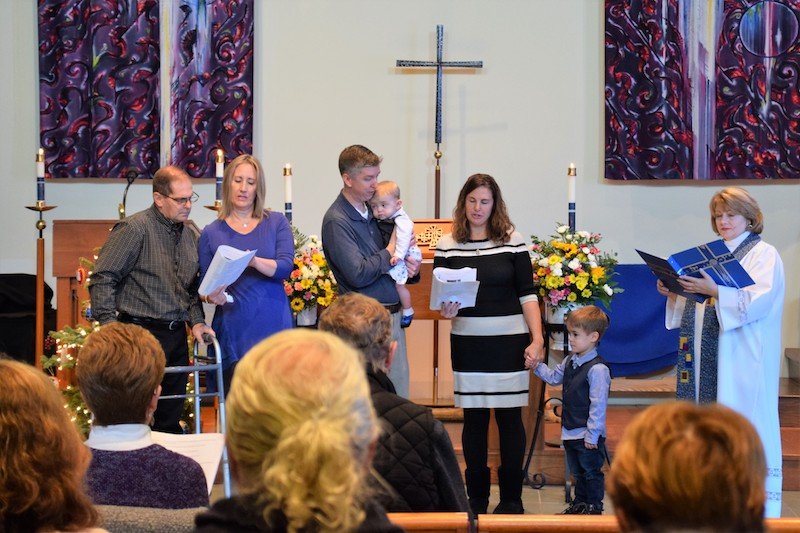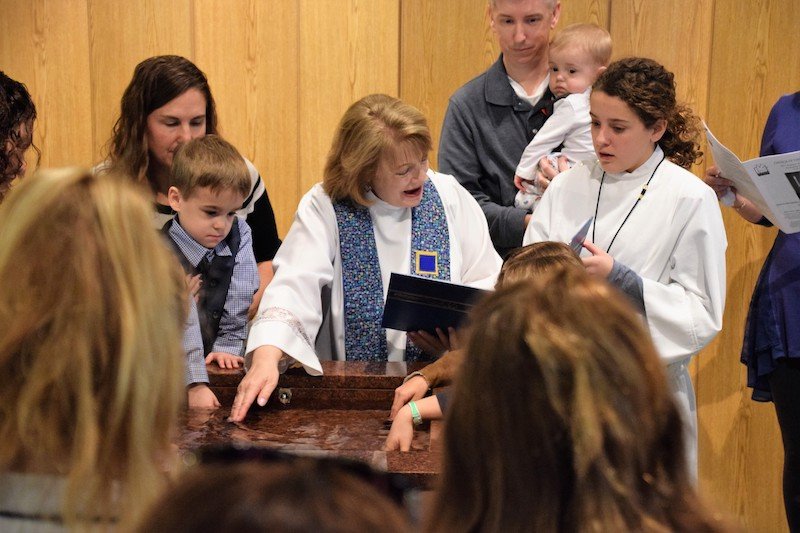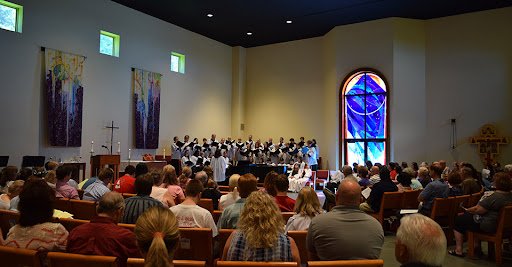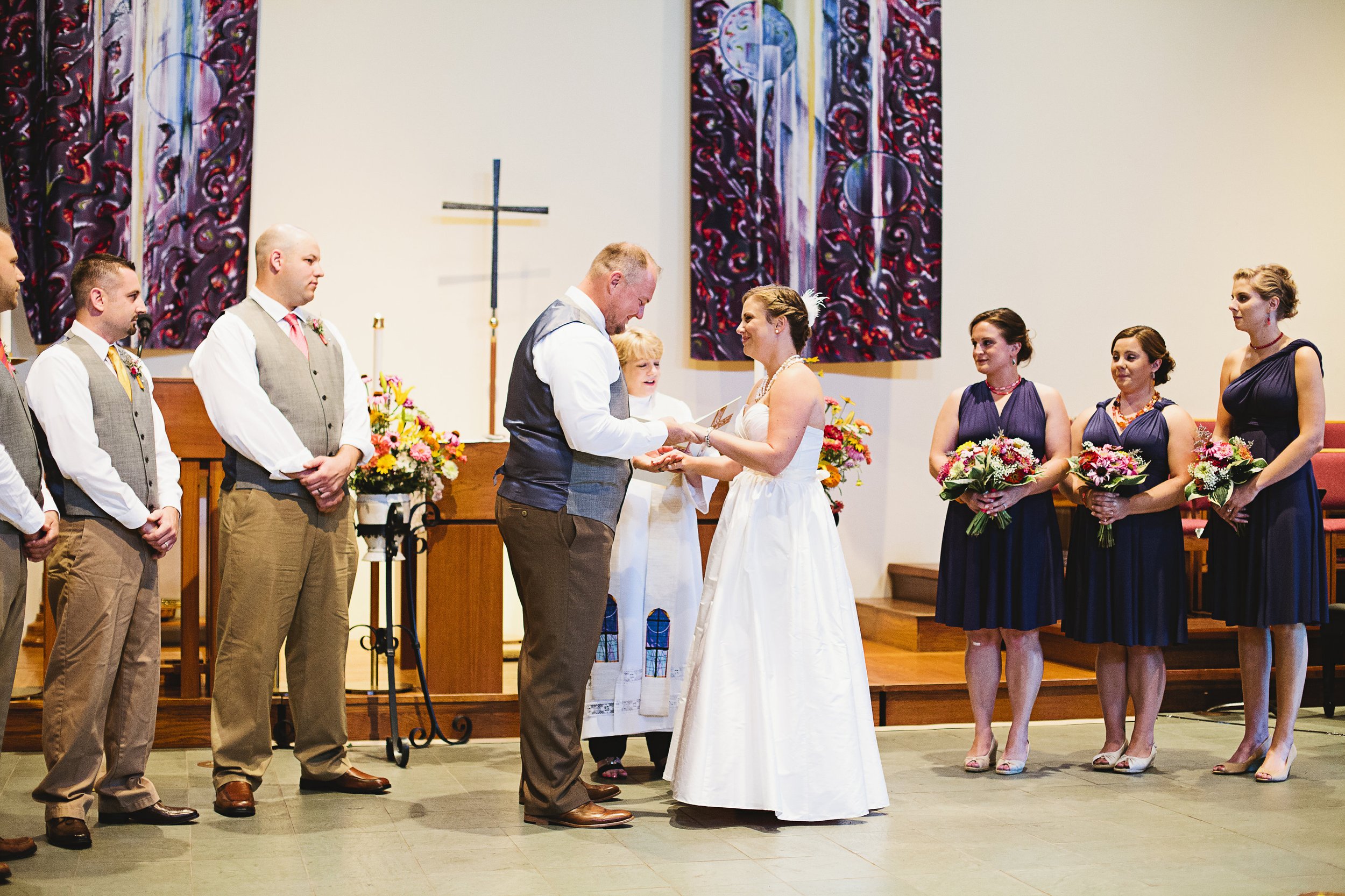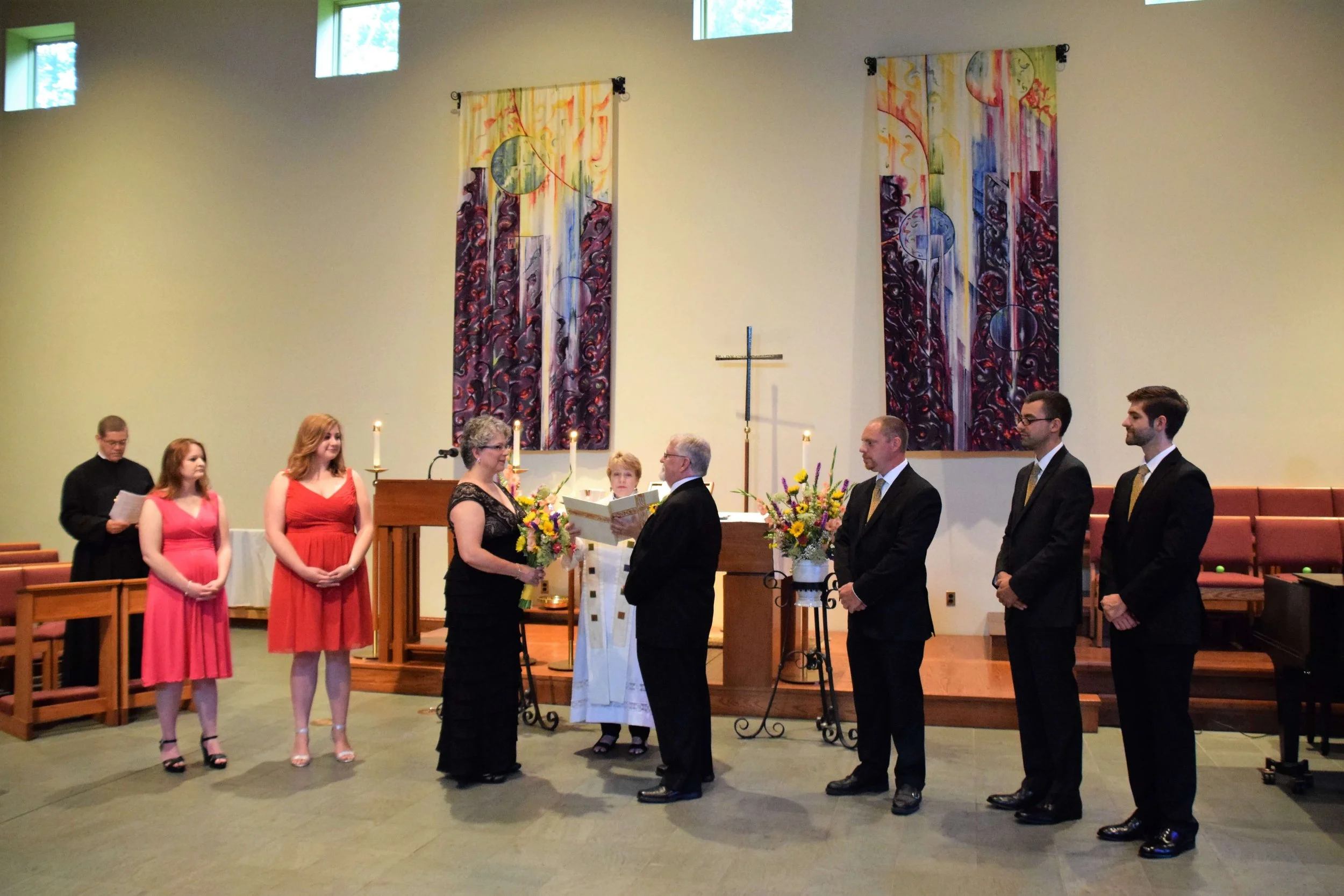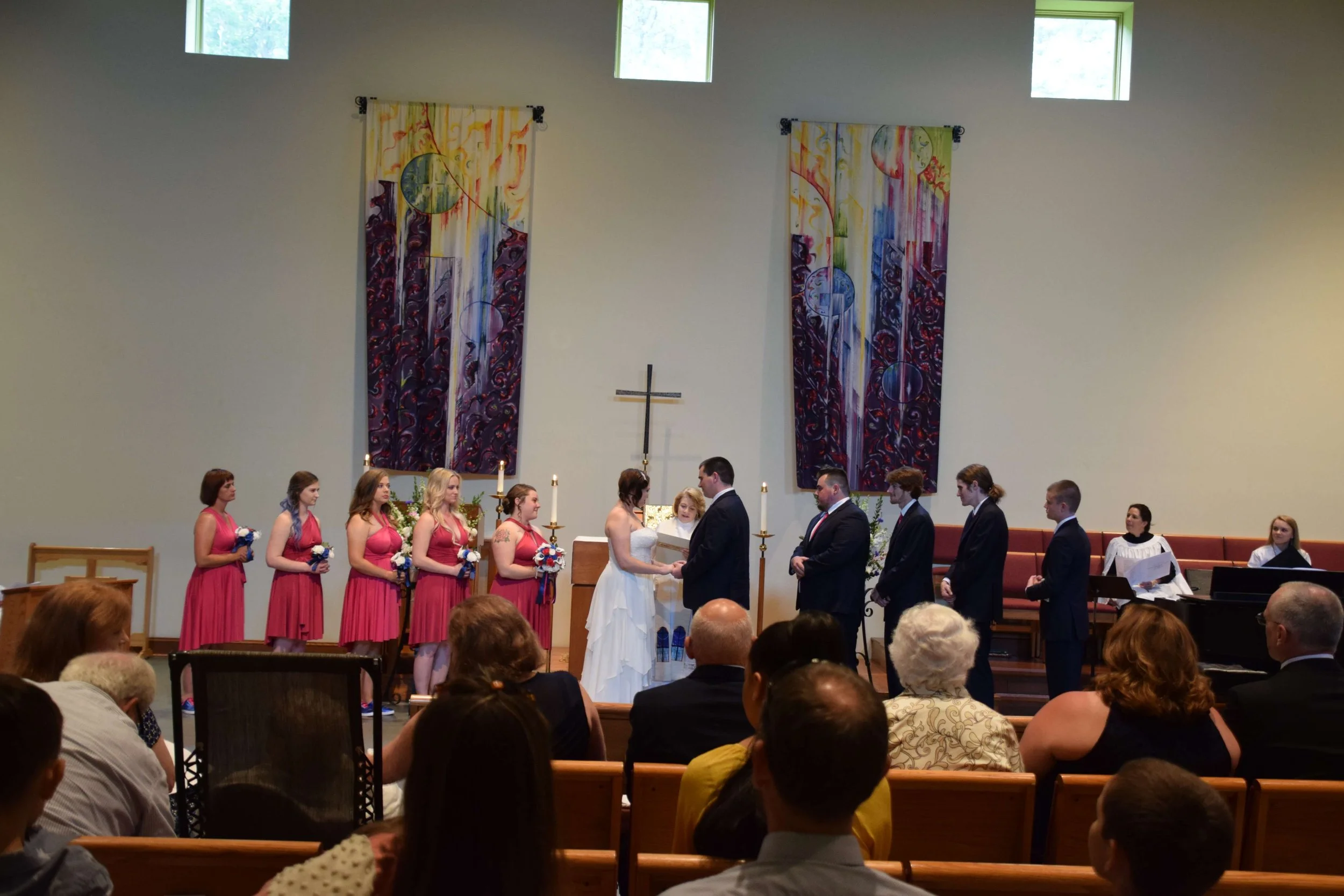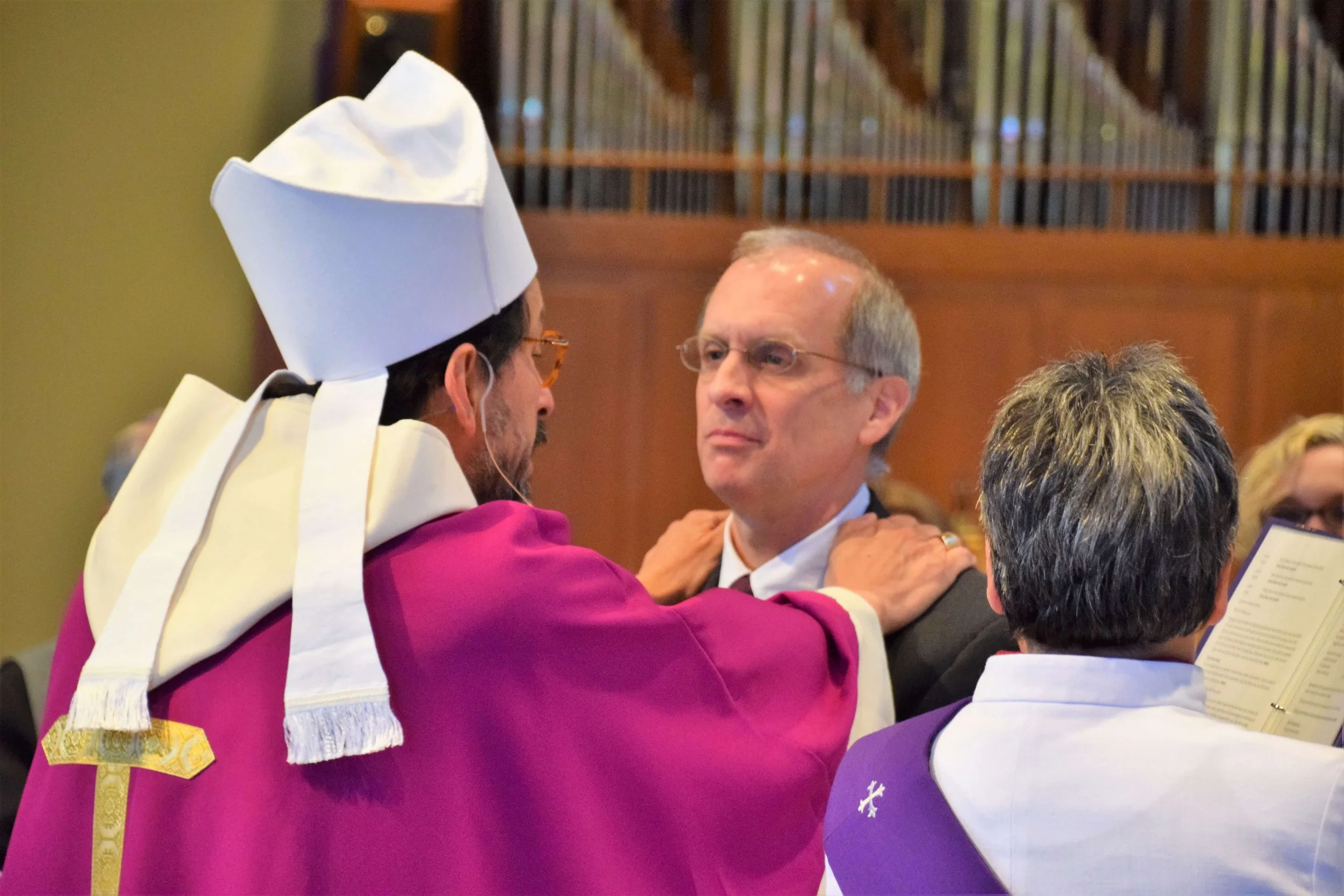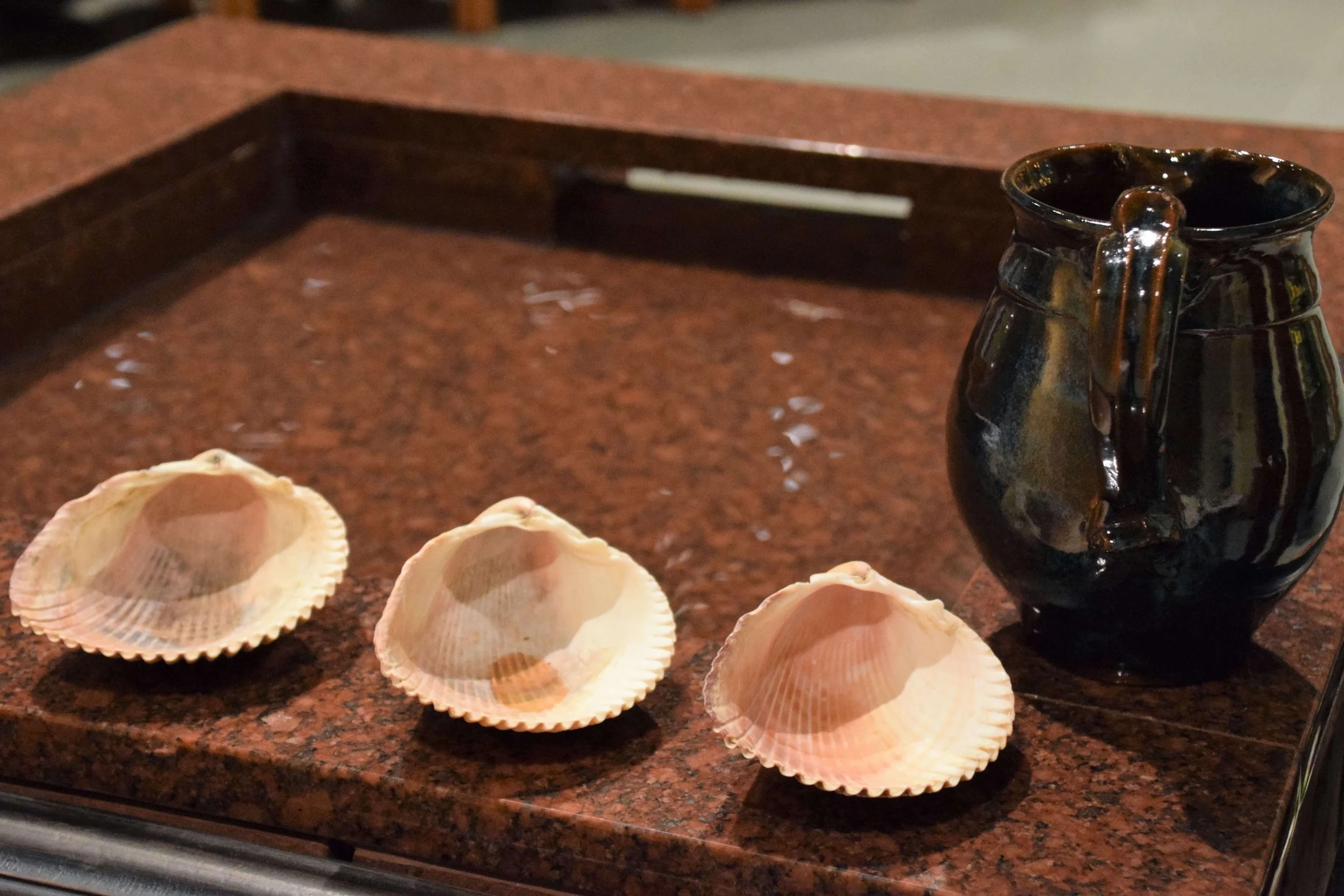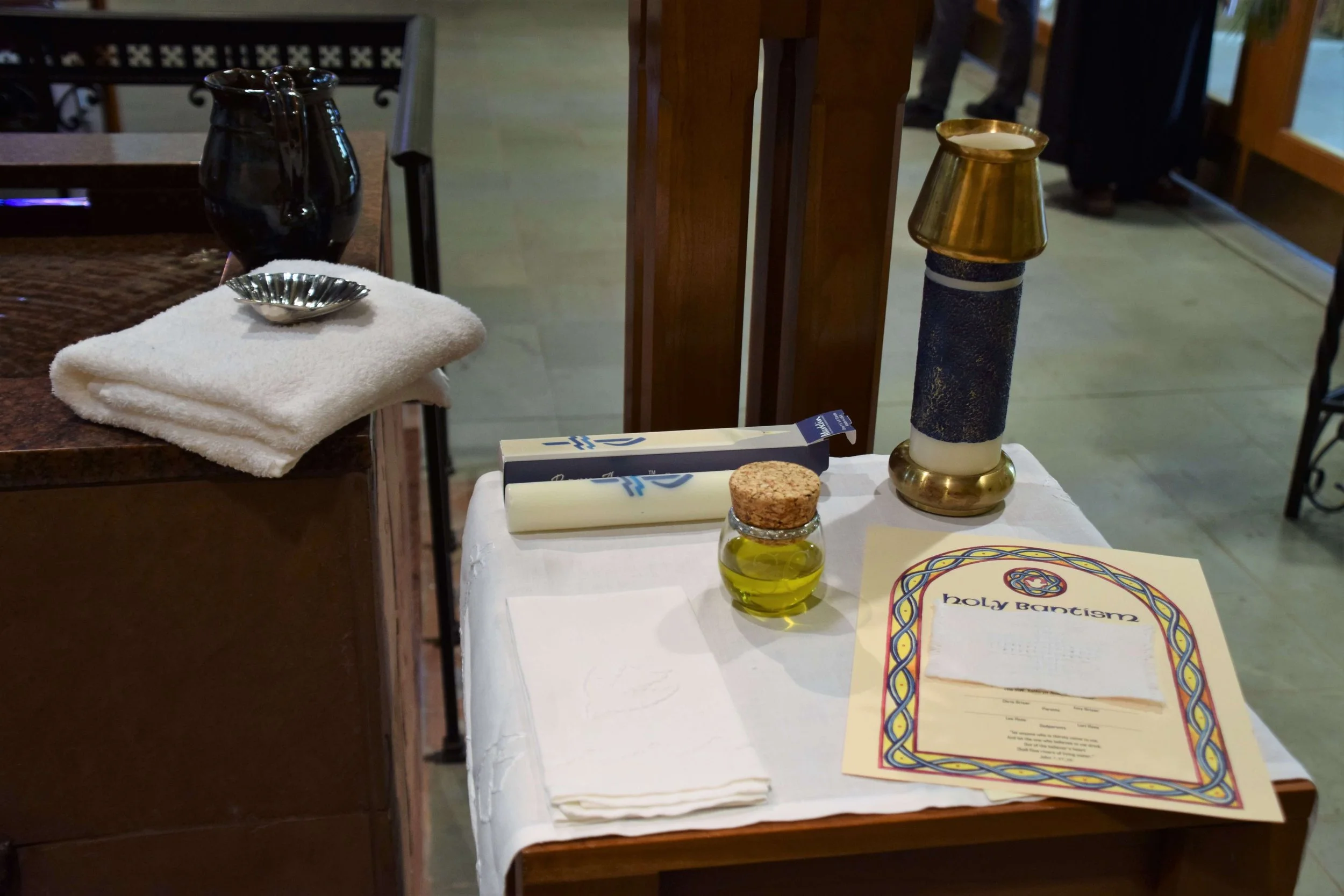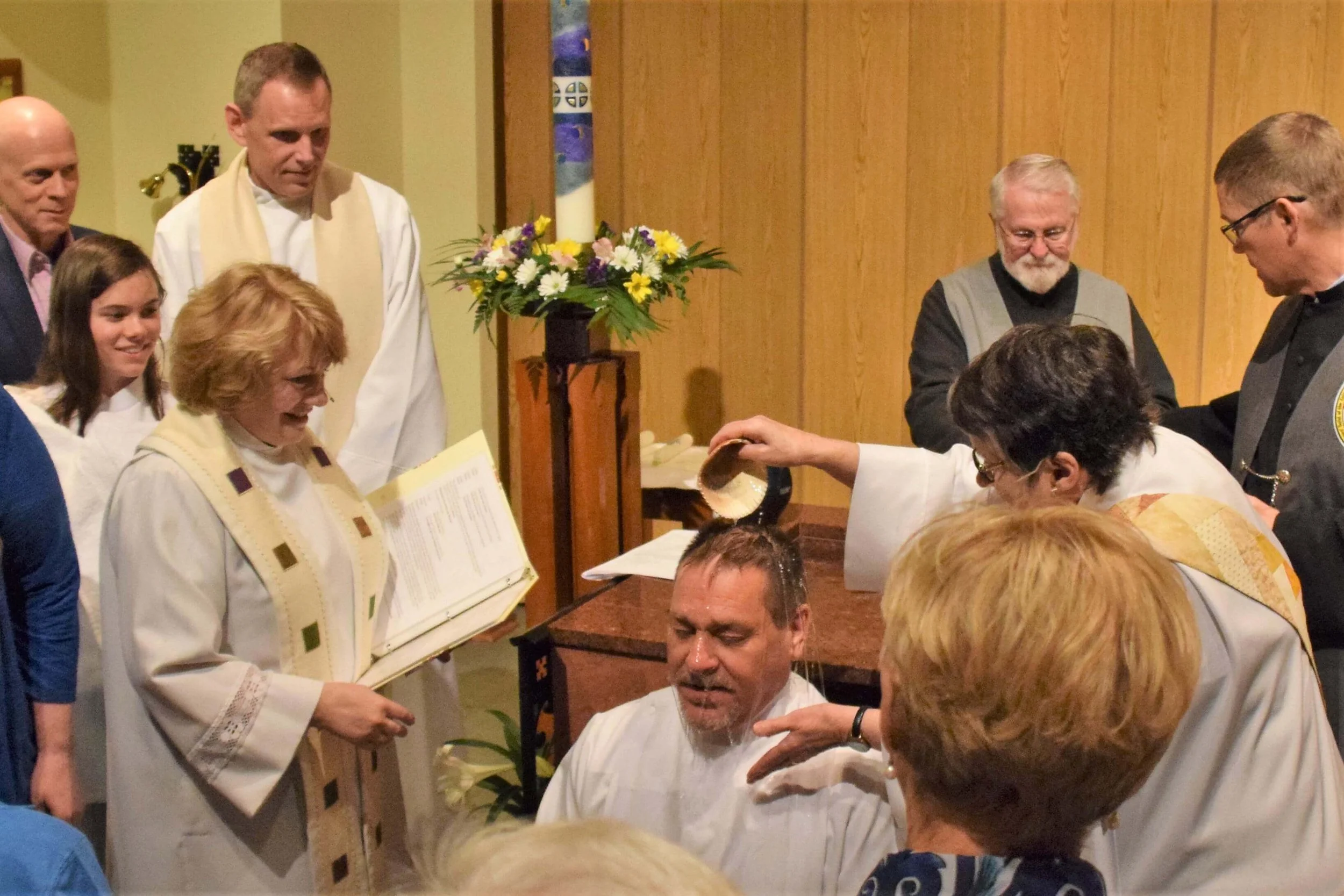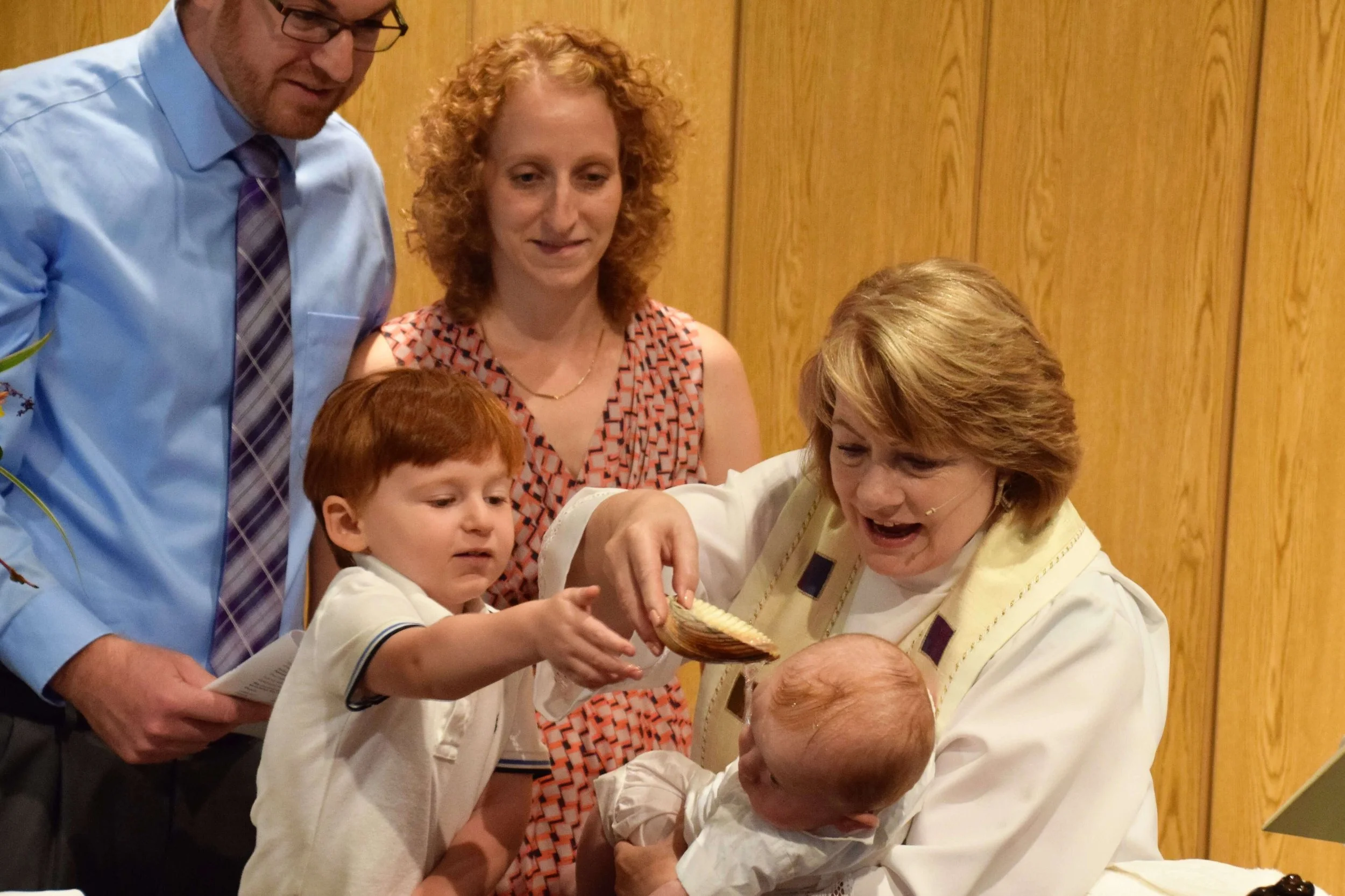
Special Rites
Baptism
Upon entering the sanctuary at Church of the Holy Spirit, we are greeted by the sight and sound of the flowing waters of the baptismal font. The font is no ordinary place, but the sacred place of our being made over into the likeness of Jesus Christ, of our being transfused with the same Spirit of God that hovered over the waters of creation and raised Jesus from the dead. The location of the font at the entrance reminds us that we are initiated through baptism into the living Body of Christ, the community of Christian faith. Baptism is not merely a ritual of infancy, but the sacrament that forever defines the orientation of one’s life. As theologian Fletcher Lowe observes, baptism “is not only a single event, but an all pervasive and lifelong process.” In baptism, we do not embark upon a personal and very private journey; rather, we become part of a people who share one faith, one baptism, and one God. We are called to share with one another and the world the transforming love of God as expressed in Jesus Christ.
-
The gift of new life in the birth of a child is a wonderful event that evokes much joy and thanksgiving. It is a life-changing event for the family. Baptism is often understood as a part of the events that surround birth—a family tradition that is used to express in the presence of family and friends some of the immense joy that is felt.
However, baptism is much more than a rite of passage or a tradition to celebrate the birth of a child. Baptism is one of the two great sacraments of the Gospel. In baptism, God adopts us as children and makes us members of Christ’s Body and the Church. Baptism requires the making of vows in which we state that we will live as Christians—a way of life that is often at odds with what comes “naturally” to us. Baptism is about God’s call to us to see that our true life, our true joy resides in a conscious intentional loving relationship with the image of God seen in human form in Jesus Christ. In baptism we are brought into this way of life as celebrated in the community of the church.
-
As Christians, we believe that we can only be fully human if we live in relationship with God and live in community with other people of faith. The forces that move us away from being truly human are not just social and psychological, but spiritual as well. In baptism, we incorporate individuals into the community of faith and promise to assist parents and sponsors/godparents in the very challenging and holy endeavor of raising children to know God and to love God.
-
Your child is ready to be baptized when you are ready to make the promises and vows in the baptismal service. Your child is ready to be baptized when you are committed to living you life and raising your children in the context of the faith community of the Holy Spirit. Some children are baptized within a few weeks of birth, others not until months or even years later, and many people are baptized as adults.
-
Baptism takes place in the church when the church family is present—at the main Sunday worship service. In the Episcopal Church, we recognize “one baptism” which means that a child is not baptized into a denomination, but is incorporated into the entire community of the Church, the Body of Christ. We also recognize that nurturing a child in faith is a challenging and ongoing responsibility of love for the parents, godparents, and family, and the entire church community. Therefore the congregation itself makes a commitment to support the child in his/her life of faith.
-
The Episcopal Church seeks to bring baptism into a significant relation to the church year, associating it with the great events in the redemptive story. As such, the preferred days for baptism are the Easter Vigil, the Day of Pentecost, All Saints’ Day or the Sunday after All Saints’ Day, and on the Feast of the Baptism of Our Lord (the First Sunday after Epiphany). However, at Church of the Holy Spirit, baptism may also be appropriately celebrated within the Eucharist as the chief service on a Sunday or other feast. The baptism of a child is an important occasion for the members of the whole congregation to renew their baptismal vows. The focus of the liturgy is on the ministry of all who are baptized into Christ, including the candidate for baptism.
-
According to the Book of Common Prayer: “Each candidate for Holy Baptism is to be sponsored by one or more baptized persons. Sponsors of infants, sometimes called godparents, present their candidates, make promises in their own names, and also take vows on behalf of their candidates. It is fitting that parents be included among the godparents of their own children.”
Usually, for candidates who are infants, parents select two or more sponsors/godparents. In the service, parents and sponsors/godparents publicly proclaim their Christian faith and promise to be an example of Christian living to the child. It is not the understanding of the church that sponsors/godparents will act as legal guardians in the event of the parents’ death. Sponsors/godparents are close friends or relatives who:
Will maintain a special relationship with the child
Are baptized Christians (not necessarily Episcopalians)
Are active members of a faith community
Will assist in seeing that the child is brought up in the Christian life and faith.
-
Infants and children are full members of the Church by virtue of their baptism; as such, they may receive Holy Communion whenever they are able to safely consume the bread and/or receive the wine. Many small children receive the bread only until they are old enough to drink the wine from the chalice. Please be assured that your child has received the full sacrament in receiving only the bread or the wine. At Church of the Holy Spirit, it is common for very young toddlers to receive Communion. Children who are too young to safely consume the bread or wine are blessed by the priest during the distribution of the bread and wine.
-
Baptism is the initiation of a person into a Christian life and also the start of a relationship with the community of the Church as experienced through participation in the life of a particular congregation. In the case of an infant or small child, the parents need to know this particular congregation and want to be a part of it.
We ask parents to consider the following before the baptism of a child:
Worship with the congregation for at least four to six months
Participate in the life of the COHS community and ministries.
While there may be situations in which the above steps of preparation may not be practical or possible, when parents commit to this spiritual groundwork, they are better prepared to undertake the gift and responsibility of raising their child as a Christian in the midst of a supportive Christian community.
In any case, parents and sponsors/godparents will meet with the Rector one or more times before the baptism to discuss the affirmations and promises they will make during the service. This is an opportunity for all participants to talk about their own Christian faith and practice and how they can best fulfill and support one another in their roles.
Baptism is:
Public and corporate
The primary rite of initiation into the community of faith, the Body of Christ and the household of God
The beginning of a new way of life in Jesus Christ.
-
No. Baptism is a sacrament and therefore a gift from God and not something that is a commodity to be bought or sold. Many families do make special gifts to the church in thanksgiving to God for the occasion of baptism of the child or adult. And, it is usual for individuals and families who are part of Church of the Holy Spirit to be active in its ministries and to contribute to the life and support of the church with an annual pledge.
-
All candidates for Baptism sit with their parents and sponsors/godparents during the first part of the service. Immediately following the sermon, the baptismal party assembles in view of the congregation. When an infant is being baptized, customarily one of the sponsors/godparents holds the child. The service includes:
Presentation of the Candidate(s). Parents and sponsors/godparents, speaking as individuals, name (first and middle names) and present the child, saying, “I present N.N. to receive the Sacrament of Baptism,”
Examination of the Parents and Godparents. Speaking as individuals, the parents and sponsors/godparents publicly proclaim their Christian faith and promise to nurture the child in the Christian faith and life.
Baptismal Covenant. The entire congregation renews its own baptismal vows.
Prayers for the Candidate(s). These are led by a layperson.
Thanksgiving Over the Water. The priest blesses the water and sprinkles the congregation as a reminder of each person’s baptism.
The Baptism. The child is then handed to the priest, who baptizes the infant in the name of the Father, Son and Holy Spirit.
The Chrismation. The child is sealed by the Holy Spirit using oil blessed by the Bishop, which reminds us that we are baptized into the one, holy, catholic and apostolic church, not just Church of the Holy Spirit. One is baptized a Christian, not an Episcopalian (or a Roman Catholic, Presbyterian, Lutheran, etc.)
Welcome. The whole congregation welcomes the newly Baptized and the peace of Christ is exchanged.
The Eucharist. The congregation, including the newly baptized, share in the sacramental meal which Christ has given us. The bread and wine are the food which sustains us on our early journey until we share in the heavenly banquet with the risen Christ.
Greeting the Baptized and Their Families. At the conclusion of the service, the families of the newly baptized are asked to stand with the clergy at the entrance. This provides an opportunity for the congregation to greet personally the newest member of Christ’s Body.
The person being baptized will receive the following as symbols and reminders of this special sacramental occasion:
A baptism candle, the light of which is a reminder of the light of Christ in our lives. Sometimes, families celebrate the baptism date every year by lighting the candle, praying together, and reaffirming the baptismal promises.
A certificate of baptism designed by a member of Church of the Holy Spirit.
A hand loomed baptismal “towel” made by a member of the COHS congregation.
Confirmation
Confirmation, Reception and Reaffirmation in the Episcopal Church
Through Baptism we are made a member of the household of God, forever bearing the mark of Christ. However, being a Christian is a journey that never ends. Confirmation is a choice people make to renew their Baptismal Covenant; it is a mature affirmation of Christian faith. Those being Confirmed freely answer, “I do,” “I believe,” and “I will, with God’s help.” Family, friends and the congregation offer their support, but the choice to say those words and make that commitment is entirely up to each person. The community—the household of God—will help those making promises keep them.
-
Confirmation, as defined in The Book of Common Prayer is “a mature public affirmation of faith and commitment to the responsibilities of Baptism.” A person is a full member of the Church through Baptism. At Confirmation, an individual receives the laying on of hands by the bishop, thereby affirming their own faith and visibly connecting to the broader Body of Christ.
-
Confirmation is “a mature and public affirmation of faith and commitment to the responsibilities of Baptism” (BCP). Reaffirmation means that you choose to re-state your commitment to Christ in The Episcopal Church, honoring your growth in faith throughout your spiritual journey. For many people, their path has wandered in and out of various denominations. Reaffirmation is a way to honor their journey and their previous public commitment as an adult while also making this definitive sacramental gesture. Reception is common for people who have been active throughout their lives in other denominations. Often, individuals who made a public profession of faith in another Christian denomination will choose to be Received into The Episcopal Church.
-
The bishop is the individual who, symbolically, represents the unity of the entire diocese. The basic “unit” of The Episcopal Church is the diocese, and the bishop as a person is a visible means of reminding us of our common bond in Christ within The Episcopal Church. When the bishop lays hands on your head during the service, it is a very tangible way for you to experience your own faith journey being welcomed into the larger journey of the Body of Christ. For many people, this portion of the sacramental service is very meaningful. A sacrament is “an outward and visible sign of an inward and spiritual grace, given by Christ as sure and certain means by which we receive that grace.” In this way, the touch experienced in the laying on of hands forever remains in your memory as an experience of grace through the Church.
-
Yes. The Book of Common Prayer defines Baptism as “full initiation by water and the Holy Spirit into Christ’s Body the Church. The bond which God establishes in Baptism is indissoluble.” Confirmation is a pastoral rite; it is an initiatory rite. This means that the sacramental nature of confirmation connects with our growth in faith and in relationship with God. Through Holy Baptism, we join Christ’s Body, either as infants or adults.
-
Yes. God may call some individuals, through the Church, into positions of guidance and leadership. For example, The Canons of The Episcopal Church state that Confirmation is required for certain leadership positions, such as Vestry members, and for some service positions such as Eucharistic Visitors, but this in no way precludes an unconfirmed individual from being considered a full member of the Body of Christ. Confirmation, in cases of leadership and guidance, emphasizes one’s public affirmation of faith within the tradition of The Episcopal Church.
Weddings
Marriage is the union of two people to live together in fidelity, love and unity until death parts them. It signifies to us the mystery of the union between Jesus Christ and the Church; therefore, it is to be honored and supported by the community. The celebration of a marriage unites two people in heart, body and mind and is intended for their mutual joy, help and comfort. The blessing of the marriage asks God to assist them in honoring and keeping the promises they make. The sacrament creates marital partners as mutual ministers and a sign of Jesus Christ’s love and compassion to the world.
-
1) Couples wishing to be married at Church of the Holy Spirit must conform to the requirements of Canon Law in the Episcopal Church. This means:
At least one of them must be a baptized Christian.
They must freely consent to the marriage, provide adequate notice of their intention to marry and subscribe to the “Declaration of Intention” which states their understanding of marriage is by intention a life-long union which provides mutual support and love, and, when it is God’s will, the procreation of children.
The couple must meet with the Rector and a licensed counselor for premarital counseling.
They must have met with the requirements of the State of Pennsylvania regarding licenses and any other provisions.
If either or both have been married before and if their previous partner is still alive, the Rector must receive dispensation from the Diocesan Bishop of Pennsylvania.
The wedding ceremony must be attested to by at least two witnesses.
2) The couple must arrange for a minimum of three premarital sessions with the Rector and three with a premarital counselor recommended by the Rector. The cost of the premarital counseling will be the responsibility of the couple. These sessions will cover a range of issues including the couple’s understanding of Christian marriage, the effectiveness of their communications and clarification of their mutual goals and priorities. Additional sessions may be required as determined by the Rector or the couple.
3) The couple is asked to maintain and deepen their commitment to their faith, including regular attendance at worship services and active participation in the life of the church community. Under exceptional circumstances, one or both of the couple may be members at another Christian church; if so, they are expected to renew and maintain commitment to their faith, including regular attendance at worship services and participation in the life of the church community. If the couple comes from differing faith traditions, they are encouraged to mutually support one another in maintaining and deepening their individual faith practices.
4) The couple and the Rector will plan the marriage ceremony in accordance with the canons, order and rubrics of the Church.
-
1) A minimum of six months notice is required to assure availability of space and necessary preparation for the wedding. No weddings will be scheduled on Christmas Eve, Christmas Day, Easter Day or during Holy Week. Weddings during the seasons of Lent or Advent will only be approved and scheduled under extraordinary circumstances. It is not customary to schedule weddings on civic holidays. The Rector may also decline to schedule weddings on other days due to programs on the church calendar, availability, or other reasons determined by the Rector.
2) Charges for families who are currently attending worship on a regular basis, pledging to the financial support of this parish, and participating in the ongoing life of the parish community are minimal. For those who are inactive members of Church of the Holy Spirit or are not members of Church of the Holy Spirit, as defined above, there will be additional fees payable one week prior to the ceremony. This fee includes at least the use of the church for the wedding service and necessary preparations prior to the service (three hours total) and one rehearsal (60 minutes maximum) to be set at a time and date mutually agreed upon by the Rector and couple.
3) The Rector and/or church administrator is to be consulted regarding the coordination of the wedding, the wedding rehearsal and the decoration of the church. Floral and other decorations, including wedding candles, should be chosen only after prior consultation with the appropriate member of the Flower Guild and the Rector. The coordination and expense for flowers and their set up is the responsibility of the couple. The placement of the flowers shall be done under the direction of the Flower Guild or Rector.
4) The placement of chairs, altar, lectern and other furnishings in the sanctuary are at the sole discretion of the Rector.
5) The music director/organist is to be consulted at least three months in advance regarding music to be used. She may provide assistance in selecting music appropriate to the occasion and in keeping with the tastes of the couple. Secular music is not appropriate for the ceremony. The approval of the proposed music by the music director/organist, in consultation with the Rector, is a prerequisite for its use. The church music director/organist receives fees.
If vocal or instrumental services are desired, the couple must make arrangements, including fees, in consultation with the music director/organist.
If the couple wishes to use the services of another organist or other musicians, the parish music director/organist must still be consulted and paid the appropriate fee. The expense for additional vocalists or musicians is the responsibility of the couple.
The use and set-up of any equipment associated with additional soloists or musicians must be arranged and managed in consultation with the music director/organist. If additional rehearsals or set-up is required, the music director/ organist may charge an additional fee.
6) There is a fee for setting up and cleaning the church building for the wedding ceremony.
7) If any of the church facilities are to be used for the reception or gathering after the wedding, additional fees will be charged as appropriate to the scope of the event. All expenses and arrangements for set-up, clean-up, caterers, food, supplies and food service are the responsibility of the couple. Arrangements for the reception must be made with the approval of the Hospitality Committee. No alcoholic beverages are to be served or consumed without the prior approval of the church Vestry. This approval must be requested at least eight (8) weeks prior to the event.
8) If the couple wishes to invite any clergy of another church (or faith leader of another religion) to participate in the ceremony, they must consult with the Rector of Church of the Holy Spirit. The decision to approve the request is solely that of the Rector.
9) There is no fee for the clergy if the marriage service is celebrated at Church of the Holy Spirit; but a donation to the Clergy Discretionary Fund is requested. There may be fees for marriages celebrated at other locations, including travel costs for the Rector.
10) If the services of a professional wedding coordinator are employed, his or her jurisdiction terminates at the door of the church. The Rector is in complete charge in the church.
11) The wedding ceremony is a joyous occasion and an act of worship; as such, photographs may be taken during the ceremony only if the photographer remains absolutely inconspicuous and refrains from all use of flash equipment. The photographer is to consult with the Rector immediately before the ceremony regarding plans for photography. The Rector will gladly cooperate with posed photographs after the ceremony.
12) The throwing of rice, birdseed or other materials or the release of doves, butterflies, or other living creatures is prohibited on the church property.
13) The parish office will gladly prepare a service leaflet so the guests may follow and participate in the service. There will be a fee to cover the costs of the leaflets. If the couple prefers to prepare their own service leaflet, it must be done in consultation and with the approval of the Rector as to overall design and content.
Funerals
The liturgy for the dead is an Easter liturgy. It finds all its meaning in the resurrection. Because Jesus was raised from the dead, we too, shall be raised. The liturgy, therefore, is characterized by joy, in the certainty that “neither death, nor life, nor angels, nor principalities, nor things present, nor things to come, nor powers, nor height, nor depth, nor anything else in all creation, will be able to separate us from the love of God in Christ Jesus our Lord.” This joy, however, does not make human grief un-Christian. The very love we have for each other in Christ brings deep sorrow when we are parted by death. Jesus himself wept at the grave of his friend. So, while we rejoice that one we love has entered into the nearer presence of our Lord, we sorrow in sympathy with those who mourn (Book of Common Prayer, page 507).
“I am the resurrection and life, says the Lord; whoever has faith in me shall have life.” So begins the service for The Burial of the Dead from the Book of Common Prayer of the Episcopal Church (The Book of Common Prayer pp. 469-503). According to the rubrics (directions) from the Prayer Book, the funeral or memorial service for a member should take place in the parish church and if possible, at a time when the congregation has the opportunity to be present.
For materials to assist you in planning for the end of your life, please click here to download a helpful booklet provided by the Episcopal Church Foundation.
-
The Pastoral ministry of the clergy and staff of Church of the Holy Spirit is to assist those who are mourning in the planning of such a service. Sometimes in the midst of grief it is difficult to focus on the details involved in planning a service. The clergy and staff strive to be sensitive to those who are grieving. To that end we offer some guidelines which we hope will be helpful to those who find themselves in the position of planning a service (or to anyone who wants to plan their own service ahead of time and file the service with the office).
1) As a general rule, either a funeral home or a member of the family contacts the Church office. The date and time of the service is arranged in direct consultation with the clergy and according to the availability of times on the Church calendar. If the priest is unavailable when the family or funeral home calls, then the pertinent information will be taken with the assurance that the priest will contact that person or funeral home as soon as possible.
2) The family or person arranging the service meets with the clergy to discuss the particulars of the service: will the service include a Eucharist, which lessons are to be read, who might read the lessons, whether or not there will be music, where the interment will take place, whether or not the name of the deceased be engraved on the COHS memorial stone, and whether or not there will be a reception. This information is then passed on to the appropriate people, i.e. Music Director, Verger, Altar Guild and Flower Guild.
3) There is no “charge” for the services of the clergy. However, a donation for the Rector’s discretionary fund is always welcome. The check should be made payable to Church of the Holy Spirit, and include the clergy name on the bottom along with the funeral party’s name. The discretionary funds enable the clergy to give assistance from time-to-time to those who are in great need in the community.
4) The service appropriately takes place in the Church, but may also be held at the funeral home chapel. The officiant at a burial office and celebrant of any Eucharist will be the Rector of this parish. If the family wishes that other clergy assist at the burial, please notify the Rector at an early stage in the planning. The Rector will, in turn, contact those clergy and make the necessary arrangements.
5) Church of the Holy Spirit uses only the burial offices provided in the Book of Common Prayer, 1979 and Enriching Our Worship 2, a resource for the Episcopal Church. At the time of the service, if the coffin has been brought to the Church, it is closed and covered with the pall from the time of its arrival. If the deceased has been cremated, the box or urn will likewise be covered with a pall.
6) It is appropriate that friends of the deceased function as lectors in the service, reading the lessons. If desired, however, lectors will be provided from among the Eucharistic Ministers of the parish.
7) Church of the Holy Spirit will provide the service leaflet. If the family would like a special cover, obituary or other information to be included, it must be provided by the funeral home or the family in a “camera ready” format. There is a charge for leaflets in excess of 50 copies.
8) If music is desired, there is a charge for the services of the Music Director. If a soloist or instrumentalist is requested, there is an additional charge for that person(s). Normally the soloist is hired by the Music. All music will be chosen in consultation with the Music Director and with her approval.
9) If requested by the family, the Flower Guild will provide appropriate flowers at the altar for a fee payable to Church of the Holy Spirit. Arrangements for flowers with our Flower Guild are dependent upon the availability of volunteers. Alternatively, the family may have flowers prepared, delivered and put in place by a local florist; this must be done in consultation with the Rector and/or Flower Guild. Sometimes friends and relatives wish to donate flowers. We encourage people to honor the deceased by giving money in lieu of flowers to the ministries of Church of the Holy Spirit. Flower arrangements which are delivered on the day of the service are displayed in the Narthex or in the Parish Hall.
10) Any contributions made to the church in memory of a person who has died or given to the church through a bequest or an endowment by the deceased person are used for the ministry and mission of the church, not for the final expenses of the deceased. All funds donated to the church are spent at the discretion of the clergy and/or Vestry.
11) All fees related to the final expenses of the deceased, including but not limited to, the services of the funeral home, burial, and ongoing maintenance of the gravesite are the responsibility of the family of the deceased.
12) If the deceased person’s cremains are to be interred at Church of the Holy Spirit, they must be either in a biodegradable container or interred directly into the ground. There is a fee for the interment that is set by the contractor. The Church will facilitate arrangements for the excavation and burial with a local burial service which will bill the family directly.
13) If the name of the deceased is to be engraved on the Memorial Stone, there will be a fee as determined by the engraver. The engraving shall be done in a manner consistent with the current engravings and with the prior approval of the Rector. The church will facilitate arrangements with the monument engraving service; the family will be responsible for reviewing and approving the contract with the engraving service. The family will be billed directly by the engraving service.
14) If the family wishes to hold a reception at Church of the Holy Spirit, arrangements must be made in advance with our Hospitality Chairperson. The costs of the caterer, food, beverages and paper goods will be the responsibility of the family.
15) There is a sexton fee.
16) For individuals who are not active (attend services on a regular basis and participate in the ministries of the church unless prevented from so doing by frail health), pledging (make an ongoing, weekly pledge commitment to COHS) members of COHS, additional fees for use of the sanctuary and parish hall will apply.
